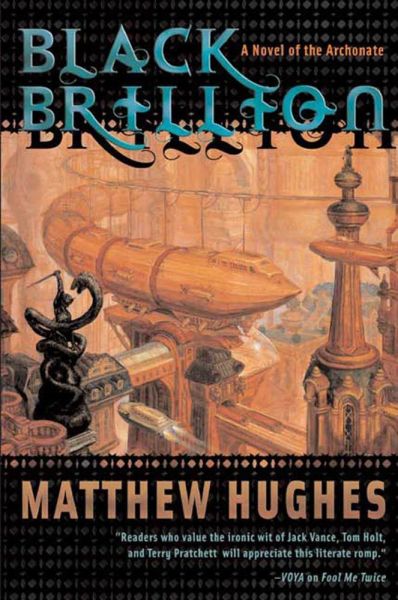A Tales of the Commons, Part Two
Black Brillion (Commons, volume 2)
By Matthew Hughes

24 Feb, 2015
0 comments
Black Brillion is one of those books I would never have thought to read if Science Fiction Book Club Senior Editor Andrew Wheeler hadn’t assigned it to me for review. I greatly enjoyed it, as did Andrew (if I am remembering correctly). Various other figures in the publishing industry loved it too, Alas, the readers, those bastards, ignored it.
It is a dismal fact that the set of the books I enjoy and the set of books that the great masses of SF readers favor do not have much overlap. [Imagine a Venn diagram where the circles do not overlap.] At times it seems like me as if me enthusing about a book is the kiss of death [1]. Surely hundreds of thousands of strangers across the world don’t buy the books they do (or rather, don’t buy the books I like) purely to piss me off?
***
In a just world, Baro Harkless’s relentless pursuit of conman Luff Imbry, a pursuit that ends with Luff’s arrest and the foiling of a dastardly attempt to defraud the public, would be rewarded. Baro would earn the respect of his superior (Directing Agent Arboghast), as well as promotion and general accolades from the Bureau of Scrutiny. Alas for young Baro, he does not live in a just world but on Old Earth. While the Archon himself is impressed by Baro’s efforts, Arboghast does not respect Baro so much as despise him (for reasons unknown to Baro). Baro’s reward for foiling the swindler is an undercover assignment that appears to have been selected with the express purpose of catapulting Baro into humiliation and obscurity.
The first hint that this is the case is Arboghast’s choice of partner for Baro: none other than swindler turned reluctant employee of the Bureau of Scrutiny, Luff Imbry.
Luff, it seems, once worked with a confederate named Horselan Gebbling. Gebbling is even now up to … something whose nature is actually unclear but no doubt nefarious … out towards the Swept, that peculiar and hostile relic of a now almost forgotten alien invasion.
Out in the Swept, young Baro will encounter Guth Bandar, former member of the Institute of Historical Inquiry. Guth has been initiated into certain bodies of knowledge that both very relevant to Baro and very much a surprising revelation to the poor fellow. Baro will discover within himself unprecedented potential, and, as a consequence, will uncover a plot that threatens the Earth itself. Poor Baro will be forced to step into a role known from a thousand legends: the Hero!
Unfortunately for Baro, not every version of the Hero survives to the end of the story.…
***
Like the stories in The Compleat Guth Bandar collection, this book is an often humorous story of good intentioned people inveigled by forces beyond their ken into playing a game for stakes that are much higher than they suspect — and playing, alas, with a skill set that seems woefully inadequate, It’s only the author’s light-hearted style that keeps this book from being a horror novel.
If you have read The Compleat Guth Bandar, or even read my previous review, you will no doubt recognize this as another version of “The Helper and His Hero,” and you already know how this will play out.
In this book, the action is seen from the Hero’s point of view and not that of the Hero’s extremely reluctant Helper. Some sections are repeated in both stories, as is only logical. Obviously, since I read Black Brillion in 2003 and only just yesterday read this history from Guth’s perspective, the 2003 James Nicoll knew nothing of the dreadful secret that lay beneath the Swept and had no idea what would eventually become of the Hero and his Helper.
Having now read them back to back, I will say Baro comes across as less human and much scarier from Guth’s perspective than he does in Black Brillion. Guth had the disadvantages of only seeing Baro from the outside and of knowing about the Commons (with which Baro is unintentionally but inextricably entangled). Guth’s perspective puts an entirely monstrous (but reasonable, given what he knows) spin in Baro and his choices. From the reader’s more knowledgeable point of view, Baro may simply seem unpolished, perhaps too narrowly focused. He is not the terrifying figure whom Guth sees when he looks at the young man.
I enjoyed this book when I read it twelve years ago, enough so that I hunted down earlier Hughes books. The recent reread was not disappointing, Although I now believe that I read this book and The Compleat Guth Bandar in the wrong order there’s a lot to this novel that isn’t in “The Helper and His Hero.” I would suggest that whether or not you have read the companion collection, you might enjoy reading this book.
Black Brillion may be purchased here.
1: My fond approval appears to be lethal for TV shows as well. Wonderfalls, This is Wonderland, Dead Like Me, Life—there’s no end to the shows that fell over dead ratings-wise as soon as I discovered them. Shows that I hate, like House — they are widely viewed and renewed, renewed, renewed.
